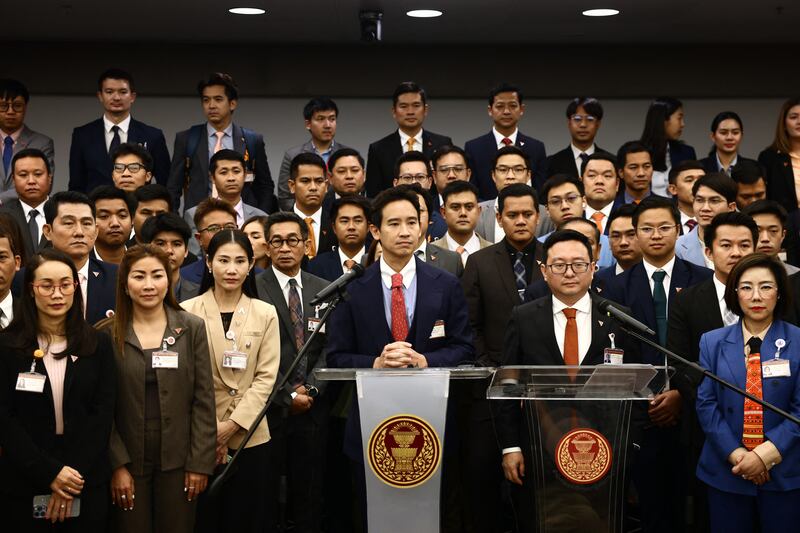UPDATED at 5.08 a.m. ET on 2024-1-31
The Thai Constitutional Court ruled on Wednesday that the Move Forward Party’s campaign to amend the country’s royal insult law amounted to an attempt to “overthrow” the constitutional monarchy, and ordered it to immediately cease reform efforts.
Thailand’s Lèse-Majesté law, also known as Article 112, prohibits insulting the king or members of the royal family and carries penalties of up to 15 years in prison.
Reforming the contentious piece of legislation was a key plank of Move Forward’s election campaign last year. It argued that the law was used to stifle dissent and was incompatible with democracy.
“If the defendants are allowed to continue their actions, it would not be far-fetched to result in the overthrow of the democratic system with the king as head of state,” the court said in its judgment.
The court ordered the Move Forward party to stop all activity, including the use of speeches, publications and advertisements, aimed at repealing or amending Article 112 of the Criminal Code.
Move Forward won the highest number of seats in parliamentary elections last year, but its bid to lead Thailand’s first pro-democracy government after nearly a decade of army-backed rule was blocked by conservative MPs and senators.
The party’s liberal campaign promises, which included plans to rewrite the constitution and end business monopolies, antagonized the country’s traditional ruling elite.
Its former leader Pita Limjaroenrat was thwarted twice in his effort to become prime minister. The Constitutional Court last week ruled that Pita was not guilty of violating election law and could return to Parliament.

Responding to the court decision, Pita said his party had no intention of overthrowing the monarchy.
“This is not just about me, this is not just about our party, but about the future,” he said at a press conference. “It’s about the health of democracy and the political landscape going forward.”
Pita said he was concerned about the ruling’s effect on the boundary between the legislature and judiciary, as well as a “loss of opportunity” to discuss the issue with “maturity.”
‘Frightening’
Despite widespread calls from pro-democracy advocates and human rights groups to abolish the Lèse-Majesté law, pro-royalist authorities have said it is necessary for upholding law and order.
Under the previous administration of Prime Minister Prayuth Chan-o-cha, a former army chief who spearheaded a military coup that toppled a civilian government in 2014, the royal defamation law was used to arrest and jail activists and leaders of the youth-led protest movement.
Move Forward supporters had feared the court decisions could provide a pretext for authorities to attempt to dissolve the party.
The Constitutional Court disbanded Move Forward's predecessor, Future Forward, in 2020 and banned its leader from politics for a decade over a campaign loan issue.
After Wednesday’s ruling, efforts to reform Lèse-Majesté would be within the purview of cabinet and the courts only, Dr. Nuttakorn Vititanon, a political scientist at Chiang Mai University, told BenarNews.
“If we want to pin our hopes on amending the law to reduce the penalty or make the law more clear, especially in terms of who can file a complaint, we will no longer be able to touch it if we consider the Constitutional Court's ruling."
“In the case of ordinary people, it is even more frightening. Anyone who proposes to amend Article 112 could be sued under Article 112 themselves.”

Earlier on Wednesday, a prominent protest leader was given a two year suspended sentence for violating Article 112. Patsaravalee “Mind” Tanakitvibulpon, 28, was found guilty in the Bangkok Criminal Court of delivering a “derogatory” speech critical of the monarchy at a 2022 rally.
Patsaravalee defended her speech in court, stating, “I spoke with respect and good intentions. It was necessary to address the relationship between the monarchy and Thai politics, where there is ongoing debate.”
Before the judgment, Patsaravalee told the media she was facing three separate charges under Article 112. She called for public support for a draft law on amnesty for those affected by political cases.
Wilawan Watcharasakwet and Jon Preechawong in Bangkok contributed to this report.
This story was updated to include quotes from Pita Limjaroenrat and analyst Dr. Nuttakorn Vititanon.
